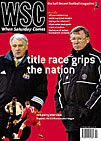 Stephen Wagg reflects on the achievements of the first man to manage England in a World Cup finals and how he cultured a generation of managers
Stephen Wagg reflects on the achievements of the first man to manage England in a World Cup finals and how he cultured a generation of managers
Walter Winterbottom lived until he was nearly 90, so a lot of English football lovers below a certain age have probably never heard of him. Still fewer among the club’s global “fan base” will have known, until this month’s obituaries, that he played for a season in Manchester United’s first team. He coached England when the team was no more than a series of grainy and occasional black and white images on the nation’s TV screens and he was gone before the medium got seriously involved with English football.
Many of the players he brought into the England team have long since either died or qualified for free bus travel. But Winterbottom was a very important figure in the history of football in this country. Arguably, he was, after Herbert Chapman, English football’s first modernist and probably its greatest moderniser. When he coached the England team, between 1946 and 1962, he was often ignored and sometimes derided. Nowadays, though, most football people want their team to have a Walter Winterbottom in charge, and indeed won’t settle for anything less.
In the first half of the 20th century the preferred belief was that Englishmen had no need of football coaching. Football was a folk art, fashioned principally on the cobbled streets of northern England and gifted to the world. Foreigners might learn from the English, but could teach the English nothing in return. The FA certainly endorsed these attitudes, initially refusing to join FIFA on its foundation and withdrawing from it again before the first World Cup in Uruguay in 1930.
However, Stanley Rous, who became secretary of the FA in 1934, was concerned for the future of the English game and immediately began to promote reform. He set up the first FA coaching course in 1936 and, ten years later, made Winterbottom the FA’s director of coaching.
Winterbottom had become one of the pioneer tutors of physical education in England. He had taught at Carnegie College (now part of Leeds Metropolitan University) and during the war had organised fitness training at the Air Ministry. At the FA his role was expanded to include running the England team, as well as the England amateur team and the (newly created) youth team.
Winterbottom took England to their first World Cup, in Brazil in 1950. But at this time the media took little notice of managers or coaches and the press barely mentioned him. In the Daily Herald, for example, there were only two references to Winterbottom during the tournament – one mentioning that he asked the players to take an afternoon nap and the other that he checked with the hotel kitchen to make sure they could cook steak and kidney pudding for the team. Nor was he allowed to pick the side. (Indeed, he never officially selected an England side during his time at the FA.) When England were embarrassingly defeated by the US at Belo Horizonte, Winterbottom was not generally held to account. “Our failure makes us a laughing stock,” wrote Clifford Webb in the Herald, “and I’m blaming the players.”
In the later 1950s the English football press spoke with a consistently forked tongue on the issue of tactical preparation. On the one hand they liked to cultivate a picture of seasoned English pros sniggering behind their hands while this “boffin” Winterbottom illustrated basic moves on a blackboard. (Walter, it was later said, was “chalky fingers”, while his successor Alf Ramsey was “muddy boots”.) On the other hand, with the Wembley defeat by Hungary in 1953, the emergent Cold War, the break-up of the British Empire and the start of European competition, they called for more coaching, so that England could remain a major football power.
Winterbottom left the FA after the Chile World Cup of 1962 but his disciples – Ron Greenwood, Malcolm Allison and Bobby Robson among them – came, one by one, into important managerial positions. By the end of the 20th century, FA Coaching Badges were mandatory. Every football player and supporter in England expected their manager to be sound strategically and, following the appointment of Arsène Wenger as Arsenal manager in 1996, the more professorial he appeared, the better they seemed to like it.
From WSC 182 April 2002. What was happening this month